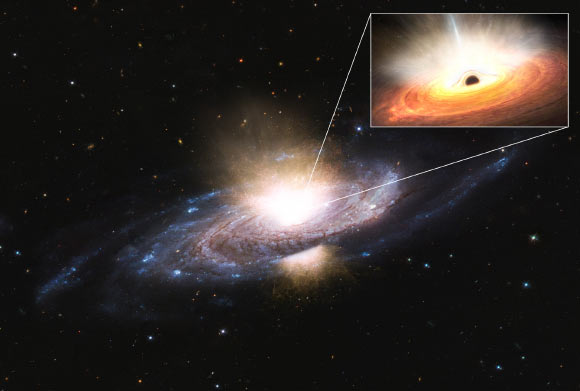Markarian 817 is a Seyfert 1 galaxy located 430 million light-years away in the constellation of Draco. Also known as Mrk 817 or QSO J1436+5847, it hosts an active supermassive black hole with a mass of 81 million solar masses.
At the heart of every large galaxy lies a supermassive black hole, whose immense gravity draws in gas from its surroundings.
As the gas spirals inwards, it bunches up in a flat accretion disk around the black hole, where it heats and lights up.
Over time, the gas closest to the black hole passes the point of no return and gets gobbled up.
However, black holes only consume a fraction of the gas spiraling towards them.
While encircling a black hole, some matter is flung back out into space, much like how a messy toddler spills a lot of what lies on their plate.
In more dramatic episodes, a black hole will flip over the entire dinner table: gas in the accretion disk gets flung out in all directions at such high speeds that it clears out the surrounding interstellar gas.
Not only does this deprive the black hole of food, it also means no new stars can form over a vast region, changing the structure of the galaxy.
Until now, this ultra-fast black hole wind had only been detected coming from extremely bright accretion disks, which are at the limit of how much matter they can draw in.
This time, ESA’s XMM-Newton spacecraft detected ultra-fast wind in Markarian 817, a distinctly average galaxy which you could say was ‘only snacking.’
“You might expect very fast winds if a fan was turned on to its highest setting,” said Dr. Miranda Zak, an astronomer at the University of Michigan.
“In the galaxy we studied, called Markarian 817, the fan was turned on at a lower power setting, but there were still incredibly energetic winds being generated.”
“It is very uncommon to observe ultra-fast winds, and even less common to detect winds that have enough energy to alter the character of their host galaxy.”
“The fact that Markarian 817…
Read the full article here

